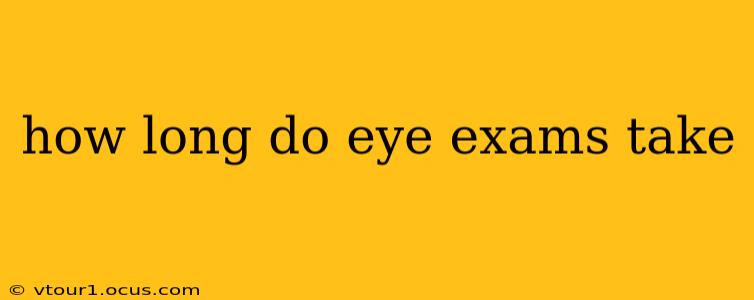The length of a comprehensive eye exam can vary depending on several factors. While a quick vision screening might only take 15-20 minutes, a thorough exam designed to detect potential eye diseases and problems can easily extend to an hour or more. This guide will break down the different aspects of an eye exam and the time each component typically takes, helping you understand what to expect during your next appointment.
What Happens During a Comprehensive Eye Exam?
A comprehensive eye exam goes beyond simply checking your visual acuity. It’s a multifaceted process encompassing several key steps:
-
Case History and Patient Interview (10-15 minutes): This initial phase involves discussing your medical history, family history of eye conditions, current medications, symptoms you're experiencing (like blurry vision, headaches, or eye dryness), and your lifestyle (e.g., screen time, hobbies). This is crucial for your eye doctor to gain a complete understanding of your ocular health.
-
Visual Acuity Test (5-10 minutes): This classic eye chart test measures your sharpness of vision at different distances. It helps determine if you need corrective lenses (glasses or contacts). This may also include tests for near vision.
-
Refraction (10-15 minutes): This is where your doctor determines the prescription for your glasses or contacts, using various lenses to fine-tune your vision. It often involves automated phoropters and subjective adjustments based on your responses.
-
Pupil Dilation (5-10 minutes): Dilating drops are often used to widen your pupils, allowing your eye doctor a clearer view of the back of your eye (retina, optic nerve, and blood vessels). This stage is vital for detecting potential issues like glaucoma, macular degeneration, or retinal tears. Note: Your vision will be blurry for a couple of hours after dilation, so plan accordingly.
-
External Eye Examination (5-10 minutes): This involves a thorough inspection of your eyelids, lashes, and the surface of your eye for any signs of infection, inflammation, or abnormalities.
-
Intraocular Pressure Measurement (5 minutes): This test measures the pressure inside your eye, which is critical for screening for glaucoma.
-
Ophthalmoscopy (5-10 minutes): Your doctor uses an ophthalmoscope to examine the internal structures of your eyes, including the retina, optic nerve, and blood vessels. This provides valuable insight into overall eye health.
-
Review and Discussion of Results (5-10 minutes): Finally, your doctor will discuss the results of your exam, answer your questions, and provide recommendations for glasses, contacts, or further testing if needed.
How Long Does a Routine Eye Exam Take?
A routine eye exam, which may not include dilation, usually takes between 30-45 minutes. This typically includes the case history, visual acuity test, refraction, and basic external eye examination.
How Long Does a Comprehensive Eye Exam Take?
A comprehensive eye exam, including dilation and more detailed assessments, can take 60-90 minutes or even longer, depending on individual needs and any complexities discovered during the exam.
What if I Need Additional Testing?
If your eye doctor identifies potential issues during your exam, further testing may be required, significantly increasing the overall time commitment. This could include additional imaging tests like OCT (Optical Coherence Tomography) or visual field testing, each adding 15-30 minutes or more to your appointment.
Can I Bring My Children for an Eye Exam?
Children's eye exams often take longer due to their shorter attention spans and the need for more playful engagement to ensure accurate results. Expect a longer appointment time, potentially up to an hour and a half or more.
In conclusion, the duration of your eye exam depends heavily on its comprehensiveness and whether any additional tests are necessary. Always communicate openly with your eye doctor to manage expectations and schedule sufficient time for a thorough examination.
